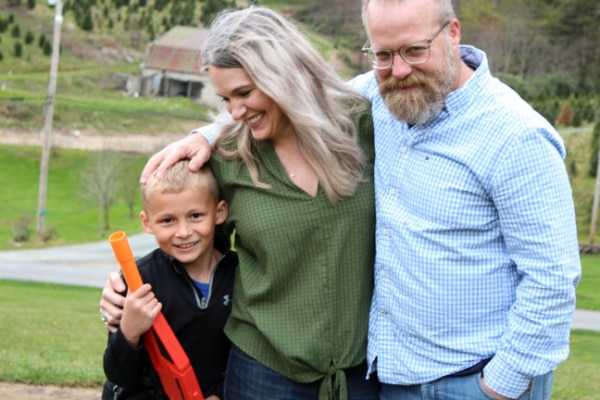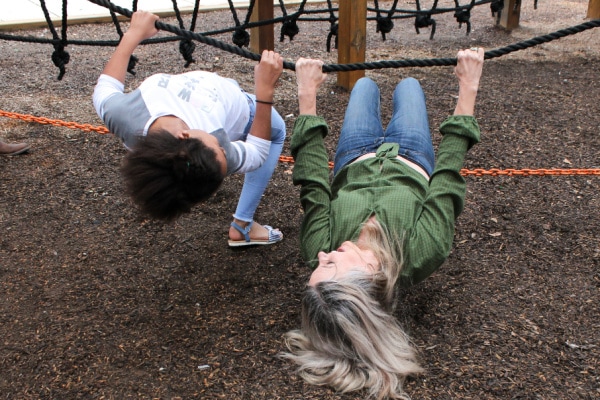There are many different definitions of a parent. Defining the word “parent” seems pretty straight forward at first. “Raising a child or children from babyhood to adulthood, in an environment of nurturance, support, encouragement, direction, guidance and love.”
What makes a parent? I think about an individual who genuinely loves, supports, nurtures, and encourages children. They also provide a space for them to be heard, valued, and seen.
Currently, there are more than 10,000 children in foster care. With a shortage of parents to provide nurturing and stable homes, many children are sleeping in DSS offices at night. Crossnore, like many other child welfare agencies, is thinking outside the box. How do we bridge the gap between keeping kids safe and finding appropriate caregivers?
Parent Roles at Crossnore
Crossnore has various avenues to fill these parent roles. These include as a Foster Parent, a Bridge Parent, a Cottage Parent, or as a Residential Advisor.

Community Foster Parents
Community foster parents live within our Avery, Winston-Salem, or Hendersonville regions. Foster parents go through a rigorous training and licensing process with the support of a licensing worker. They ultimately provide care to children until permanency can be reached. Permanency can be reached through returning a child home to their biological parents, guardianship, adoption, or transitioning into adulthood.
Bridge Parents
Bridge Parents live on-campus on our Avery or Winston-Salem locations. In the Hendersonville region, they live in an agency house in the community. Bridge parents go through the same training and licensing process that a foster parent does. These parents, however, are also full-time Crossnore employees. Bridge parents are trained in trauma-informed care. Along with their staff team, they work closely with birth parents and their children. They work together to nurture and grow the family relationship while their children are placed in our care. The goal for the children and families in this program is reunification.
Cottage Parents
Cottage Parents live on-campus on our Avery or Winston-Salem campuses in a cottage. A cottage has up to nine children in foster care. Two cottage parents are on shift together and follow an every-other-week shift work schedule. This seven days on, seven days off shift work is not for everyone. But for the right couple or individual, it’s the perfect opportunity to recharge. On your off week, you can travel, engage in hobbies, or pursue a creative side-job.
Cottage parents model healthy relationship-building and support children as they define and reach their own goals. Interwoven with campus-based foster care and therapeutic services, spiritual life at Crossnore is an integral part of our holistic model of care. As a Christian Sanctuary of hope and healing, we care for children in foster care physically, emotionally, and spiritually.
Residential Advisors
Residential Advisors follow the same model and schedule as cottage parents for youth who are 14 to 21 years old. The Advisors serve in our Youth Independent Living (YIL) program. Youth often transition from on or off-campus foster care into the YIL program. In YIL, they learn to make their own decisions, set goals, and develop concrete plans for the future. Youth also learn essential skill. These include opening and managing a bank account, how to drive, and the process of applying and interviewing for a job. Our YIL program currently has two on-campus studio apartments. Youth are able to transition to living in their own apartment while having the support and security of the program.
Why Be a Foster Parent
Some of the caregivers in our parent roles at Crossnore graciously shared their heart for this work.
Mrs. Mathis, a Crossnore foster parent, shared her heart. “I wanted to fulfill that mother role whether it was my biological child or not.” Once she and her husband became licensed foster parents, she realized that this is exactly what they should have been doing all along. Mrs. Mathis shared, “Foster care brought me into a community that I will forever have ties to.”
The Mathis family started visiting their now-adopted daughter during the peak of COVID. This was a tricky and ever-evolving eight month process. The family hung in there. They took advantage of this prolonged visitation time to establish a presence in Ava’s life. This time led to a trusting relationship. One day during a scheduled visit, Ava grabbed her water cup and said “Here, mommy.” Mrs. Mathis stated, “We took the time to earn her trust, and Ava let us know when we were in.”
Four months after Ava came home with them, the Mathises accepted the placement of her biological brother. They are now in the process of adopting him. Mrs. Mathis said she now believes her sole purpose is to provide a safe and loving home for these children.
Why Be a Bridge Parent
Deb Eiserman has been a Cottage Parent, a Residential Advisor, and now a Bridge Parent. Deb stated, “Being a caregiver is to plant a seed and to watch the growth of a child. Sometimes you’re the one who sees that change and sometimes it’s someone else.”
She loves working in the Bridge Parent program because she’s working with a family who wants to reunite. Deb is counting on the parent(s) and child(ren) wanting to work together. When asked what calls her to this work Deb did not hesitate. “Unconditional love, understanding what each child needs at the various stages in their lives, and giving a family hope that they still have time. Helping them get back together.”
Why Be a Residential Advisor
Sophia Harvey says a caregiver is someone who provides consistent support to our youth. “Not only are we providing a safe environment, but also a place to grow. To become a positive member of society. To teach them new things. For them to see life in a different way.” Sophia has also made a career from being a caregiver. For several years she was a cottage parent and now she serves as a residential advisor. Sophia shared, “This is my path because I genuinely like to care for people who have been hurt and who have not received the love that they need and deserve. Seeing the face of a happy and loved child is priceless.”

The Rewards of Being a Parent
Regardless of one’s role, being a caregiver can be challenging. But even with the challenge comes incredible rewards. Protecting and encouraging the most vulnerable among us is often the foundation of a strong community.
Here at Crossnore we are working each to strengthen the communities we serve, one child at a time. But we can’t do this without you. Crossnore is always looking for people who have a genuine passion for parenting. We urge you and your family to look into being a professional caregiver. If you can’t, find ways to support those who have chosen this path. Please be a part of the solution. One caregiver at a time.
For more information on foster care, visit crossnore.org/foster-care.
To inquire about becoming a parent at Crossnore, visit crossnore.org/professional-parents.



